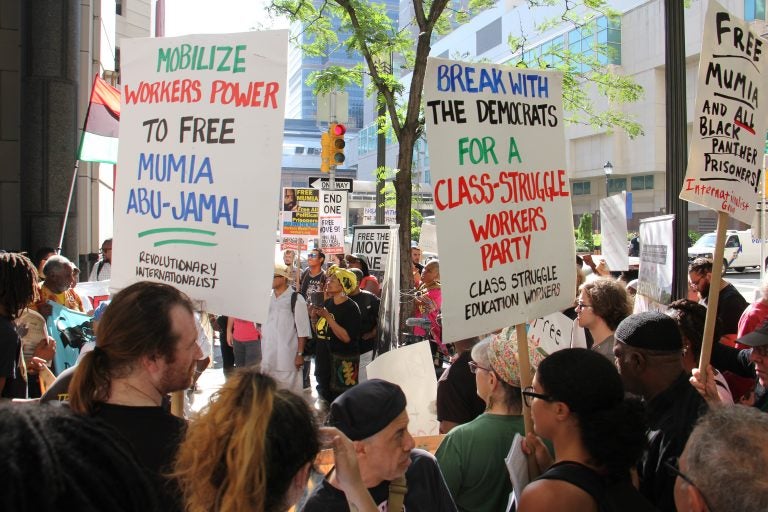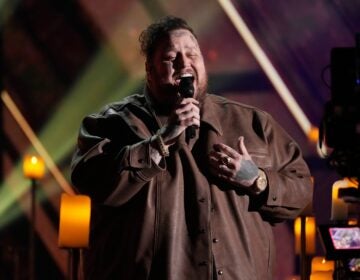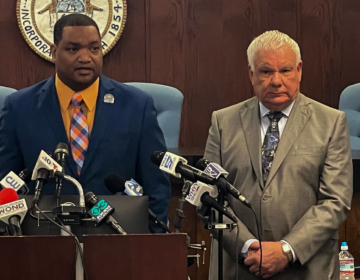Upset with delay on Abu-Jamal ruling, officer’s widow ordered from courtroom
Final decision on Mumia Abu-Jamal appeal in murder case delayed for a month

In August, demonstrators call for the release of Mumia Abu-Jamal who was convicted of killing a Philadelphia police officer in 1982. (Emma Lee/WHYY)
A two-year effort to get Mumia Abu-Jamal another chance to appeal his 1982 murder conviction is on hold for at least another month.
After listening to oral arguments on Monday, Philadelphia Common Pleas Court Judge Leon Tucker gave Abu-Jamal’s lawyers until Dec. 3 to track down some additional evidence. If nothing is found, it is expected Tucker will make his ruling, possibly without another hearing.
The decision drew an emotional outburst from Maureen Faulkner, the widow of Daniel Faulkner, the Philadelphia police officer Abu-Jamal was convicted of killing.
“I have another 30 days that I have to go through this pain,” said Faulkner, in tears, before she was ordered out of the courtroom. “This is wrong,” she said as she was escorted out.
Tucker took the opportunity to send a message of his own.
“The court is not going to rush to judgment in this case,” he said. “No matter how long it takes, the court is going to do the right thing.”
The odds of an appeal hinge on what Tucker decides about another man: Ronald Castille. Specifically, his time as chief justice of the Pennsylvania Supreme Court and his days as Philadelphia district attorney.
On Monday, Abu-Jamal’s lawyers again argued that Castille should have recused himself when their client’s case went before the high court because Castille fought Abu-Jamal’s initial appeal when he was district attorney.
They also said Castille personally pushed former Gov. Bob Casey to sign the execution warrants for death row inmates convicted of murdering a police officer. And Castille urged a former state senator to pass legislation aimed at expediting – and creating a timetable – for that process, Abu-Jamal’s attorneys argued.
“There’s lots of reason to be concerned about Ron Castille’s neutrality when he became a Supreme Court justice,” said Judith Ritter, one of Abu-Jamal’s lawyers, after the two-hour hearing.
In a 1990 letter to Casey, repeatedly cited by both sides, Castille urges him to “send a clear and dramatic message to all cop killers.” The second page of the letter includes the names of several inmates, but not Abu-Jamal, at the time in the midst of his direct appeal.
Prosecutors argued that helps prove Castille had no “personal significant involvement” in Abu-Jamal’s case, adding there’s nothing unusual about a district attorney reaching out to the governor or lobbying a lawmaker.
What’s more, “Castille is not the DA when [Abu-Jamal] was arrested, when he was put on death row,” said Assistant District Attorney Tracey Kavanagh, who is prosecuting the case.
Ed Rendell, the former governor and Philadelphia mayor, was the city’s top prosecutor at the time.
Before delaying his ruling on the high-profile case, Tucker revealed this ruling would not be easy for him.
“I’ll be candid, this is a difficult case,” he said.
WHYY is your source for fact-based, in-depth journalism and information. As a nonprofit organization, we rely on financial support from readers like you. Please give today.





